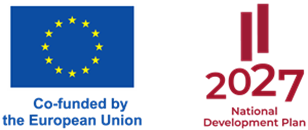From the basement of a private home to 150,000 products sold throughout the world

Ette Tete is a family-run business whose mission is to help parents create an environment that is conducive to their children’s development and engagement in everyday activities. Founders Linda and Krišjānis started out in 2016 with the production of children’s furniture and developmental toys in the basement of their family home. Today, Ette Tete is an internationally recognised brand which, over the course of eight years, has sold around 150,000 products. Nearly all the company’s production (99%) is exported abroad, to such countries as the Netherlands, Germany, Italy and South Korea.
The furniture and toys produced by the company are distinguished by their multi-functionality, safety and aesthetics. For example, one of their most popular products is a step stool allowing kids to reach the adult world of kitchen surfaces or the sink, but it can also transform into a comfortable table when needed. These products have been inspired by Montessori principles to facilitate children’s natural development and free movement.
The idea for Ette Tete was born from the family raising their own three children and seeing that there was a lack of high-quality, functional and safe furniture for children on the market. Linda found the step stools available at the time to be unwieldy, uncomfortable and not all that attractive. On online forums for parents, she often saw people asking whether such furniture was available and where it was sold. This encouraged the couple to try out their first experiments by creating furniture at home. Today, Ette Tete has grown into a company with a team of 17 and a state-of-the-art factory in Tīnuži where the furniture is produced from locally sourced Baltic birch plywood.
Use of state support has been a key factor in the successful development of the company. Ette Tete joined the business incubator established by the Latvian Investment and Development Agency a year after the company was founded. Here, Ette Tete received financing, training and the opportunity to work alongside like-minded businesses. Today, the company is taking advantage of the export promotion programme and is a regular participant of international trade fairs to reinforce its standing in foreign markets.

CEO Linda Riekstiņa-Šnore says: “It is difficult to say where we would be today without the state support tools. Our commitment to grow would be the same, but these tools allowed us to reach our goals much faster. They freed up resources allowing us to bring new ideas to life.” She stresses the importance of the incubation period, during which the company not only used the available support tools but could also be part of an inspiring community where entrepreneurs shared the challenges they faced and the solutions they had come up with, which allowed Ette Tete to see that the issues they encountered were certainly not unique.
Looking ahead, Ette Tete plans to develop a new factory, expand their product range and continue solidifying their positions in existing markets, whilst also entering new ones, including Japan and the United States.

Since 2024, the Business Incubation Aid Program has been implemented by LIAA representative offices in Latvia and any company up to the age of 5 operating in the supported sectors can apply for the programme.
This article has been produced with financial support from the European Regional Development Fund, Small and Medium Enterprises Programme, Incubator Subproject.
